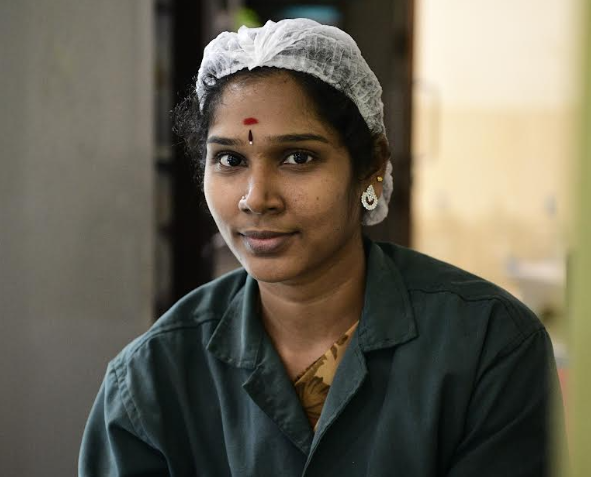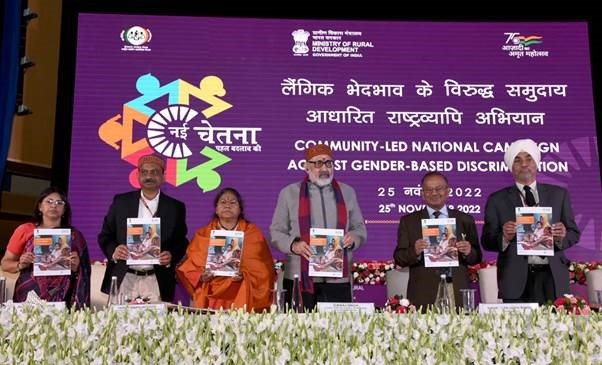Need for Evidence on Skilling in India
In recent years, India’s demographic dividend has sparked scrupulous policy actions to increase its labour force participation. With India having the largest youth population in the world, the government aims to empower the youth using the ‘4E approach’ (Education, Employment, Entrepreneurship, and Excellence). The strengthened emphasis on the aforementioned pillars is inclusive of skill development and has therefore generated a renewed buzz around it. Skill development is increasingly considered a key stepping stone not just towards enhancing India’s overall labour force participation, but especially for the economic upliftment of a pertinent group of beneficiaries, women.
ILO’s Global Employment Trends (2013) rank India 120th out of 131 countries in female labour force participation. The Periodic Labour Force Survey 2020-21 reports that only 34 per cent of females within the working age group are employed. Skilling is looked upon as one of the solutions to the problem. This blog argues that good quality data is a prerequisite to assess the effectiveness and gendered outcomes of skilling programs running across the country.
If we were to google the terms “skill”, “India” and “women” today, approximately all search results would point towards and encourage the importance of skill development for women’s economic empowerment. Even though skill development programmes have existed for decades, they have found a recent push to generate and ensure improved work opportunities for the heightened employable population of the country. Budget 2023-24 also prioritized funding for the launch of the national flagship programme on skill development: Pradhan Mantri Kaushal Vikas Yojana (PMKVY) 4.0, which, in lieu of the rising technological advancements, aims to promote skilling in new-age courses like 3D printing, robotics, AI etc.
Several skill development programmes are running across the country, which are differentiated on the basis of their funding sources, policy-making, and implementation bodies, etc. Guided by the National Policy on Skill Development (2015), various schemes are run by the state such as the aforementioned PMKVY, Deen Dayal Upadhyay Grameen Kaushal Yojana (DDUGKY), Jan Shikshan Sansthan (JSS), and National Apprenticeship Promotion Scheme (NAPS). The central body that coordinates all possible skill development efforts across the country is the Ministry of Skill Development and Entrepreneurship (MSDE), accompanied by its various facilitating bodies. The Ministry was launched in 2015 to improve the link between the demand and supply of skilled workforce and further build the vocational and technical training framework.
Among various facilitators for skilling schemes, National Skill Development Corporation (NSDC) was set up to help generate funding through Public-Private-Partnerships (PPP). Corporate Social Responsibility (CSR) funds have also driven towards skill development for women.
With such a range of policy intentions and the subsequent programmatic actions towards skilling for women, it is important to gauge how they have impacted women’s engagement in the labour market. The cardinal focus could be to understand how far the extensive skilling ecosystem has upskilled and led women towards being sustained labour force participants, what works for them within these skilling programmes, and what challenges continue to exist that require redevelopment.
According to the Skill India Reporting Hub, the administrative data on the overall implementation of PMKVY portrays that out of more than 60 lakh women enrolled for the scheme, less than one-fifth ended up getting placed. This stark difference between enrollment and placement highlights the need to understand and inspect the skilling process in India. Just like any other social development program, gender sensitivity is also pertinent to the skilling process- wherein, challenges specific to women exist, in addition to overall hurdles with respect to the existing labour supply and market demand.
Gender sensitivity in skilling programs goes on to but is not limited to, recognizing differential needs, building improved support systems, generating disaggregated information, and taking further action based on continued reflection and feedback. Setting up of 5000 new Skill Hubs all across India to further the efforts of Skill India, and “provide comprehensive vocational and skilling training” was highlighted during Budget 2023-24. However, how these hubs will undertake efforts to increase enrolment and retention of women candidates is yet to be seen.
The state-led skilling schemes do undertake measures for increasing women’s participation through reservation, running women-only Industrial Training Institutes (ITIs), and providing stipends for travel and residence. However, the statistics suggest the need to go beyond them. There is a need to reflect, regroup and renew our actions to make the continued efforts towards skilling more effective.
It is arduous to delve deeper into the challenges that surround the skilling of women in India due to limited data availability. Administrative data on state-led skilling programs is available through the following portals: Skill India Reporting Hub, NCVT MIS, PMKVY Dashboard, NRLM (on DDUGKY), MSDE dashboard, and NSDC. The data shared through these portals vary with respect to the indicators they contain, and are often not consistently updated or are sparsely filled. The most desolating fact within these available portals is that only a few provide sex-disaggregated information. Even when examined at the state level, only a few states (Assam and Bihar) provide sex-disaggregated information on their MIS administrative portals on skilling. This is accompanied by a lack of information on process indicators – where ‘enrolment of candidates’ is the consistent measurable indicator, with information lacking on other process indicators such as completion of training, certification, placement, etc. Therefore, the need of the hour is to first build information systems that would help monitor the track we are on before we pace up our actions.
Further, the data on post-placement bifurcation, including employment type, retention rates, etc., is also publicly unavailable. Information on PPP and the role of the private sector in the skilling ecosystem are also not amalgamated within these portals. Data on efforts added by such non-state actors to skill the present population are also almost completely lacking.
The Periodic Labour Force Survey (PLFS) is one of the nationally representative surveys that collect primary data on India’s labour force participation, which also happens to include some indicators on the state of skilling in India. Apart from the sparse information obtained through PLFS on skilling, the assessment of the effectiveness of the skilling ecosystem in India is predominantly seen in micro studies. Though it is found that skilling enables women to join the labour force, many studies report challenges that vary depending on the different stages of the skilling process – from the generation of policies, and release of programs or schemes to their uptake, operation, and finally, their contribution to the existing labour force.
The literature further reports that the participation and uptake of women within these programs are deeply affected by societal norms which control their educational status, decision-making, mobility, and access to information and technology. Importantly, these barriers also encompass how skilling programs are rolled out. For example, the introduction of courses under PMKVY for a ‘digital India’ in lieu of technological advancements would also require taking cognizance of the existing gender differential access to technology.
Therefore, robust evidence generation is pertinent for the skilling programs to identify challenges, improve and run effectively. Such an effort may help track changes in female labour force participation through skilling. However, to further help improve women’s overall well-being and standard of living, access to quality jobs with improved working conditions is necessary. It is essential therefore to track where the women tend to get employed, the sectors they are employed in, and the working conditions they are exposed to by uniting the broad skilling ecosystem in India. Developing such a system would require a holistic approach towards skilling which ensures synergy between policy-making, funding, and implementing bodies. The MSDE could act as a body that oversees these processes and puts into place an accountability mechanism.
Though skilling may prove to be an essential factor in helping more women join the Indian workforce, a meaningful policy dialogue on the subject will only be possible with the support of enhanced quality of data. This will not only be possible through cogent data collection, but also making existing data more accessible to development practitioners and policymakers. Such intersectional data can lead to meticulous future actions to address gender inequality and can act as an essential driver of economic growth and prosperity. But most importantly, aid in uplifting individual rights and empowerment.
Prakriti Sharma is a Senior Research Associate at IWWAGE, and has previously worked in the intersection of migration and feminist economics. She is currently engaged in visiblizing women’s work through its improved measurement.



 Gender-based discrimination, often seen in the form of violence against women, girls and gender-diverse individuals, continues to be one of the biggest deterrents to achieving self-growth, well-being and a life of dignity. The National Family Health Survey (NFHS)-5 data reveals that 30% of women between the age of 18 and 49 have experienced violence (physical, sexual, or emotional) since 15 years of age. It also reveals that as many as 77% women never sought help from anyone about the violence inflicted on them. Figures from the National Crime Records Bureau’s (NCRB) ‘Crime in India 2021’ report show that India registered 31,677 cases of rape in 2021 – an average 86 daily – while nearly 49 cases of crime against women were lodged every single hour. With a global rate of 1 in 3 women being a victim of violence, and given its physiological and psychological impacts, this human rights violation deters individuals from achieving their full potential and living a life of their choice. Individuals from socially marginalized groups are more acutely affected as gender-based violence is an added layer of vulnerability.
Gender-based discrimination, often seen in the form of violence against women, girls and gender-diverse individuals, continues to be one of the biggest deterrents to achieving self-growth, well-being and a life of dignity. The National Family Health Survey (NFHS)-5 data reveals that 30% of women between the age of 18 and 49 have experienced violence (physical, sexual, or emotional) since 15 years of age. It also reveals that as many as 77% women never sought help from anyone about the violence inflicted on them. Figures from the National Crime Records Bureau’s (NCRB) ‘Crime in India 2021’ report show that India registered 31,677 cases of rape in 2021 – an average 86 daily – while nearly 49 cases of crime against women were lodged every single hour. With a global rate of 1 in 3 women being a victim of violence, and given its physiological and psychological impacts, this human rights violation deters individuals from achieving their full potential and living a life of their choice. Individuals from socially marginalized groups are more acutely affected as gender-based violence is an added layer of vulnerability.
















































